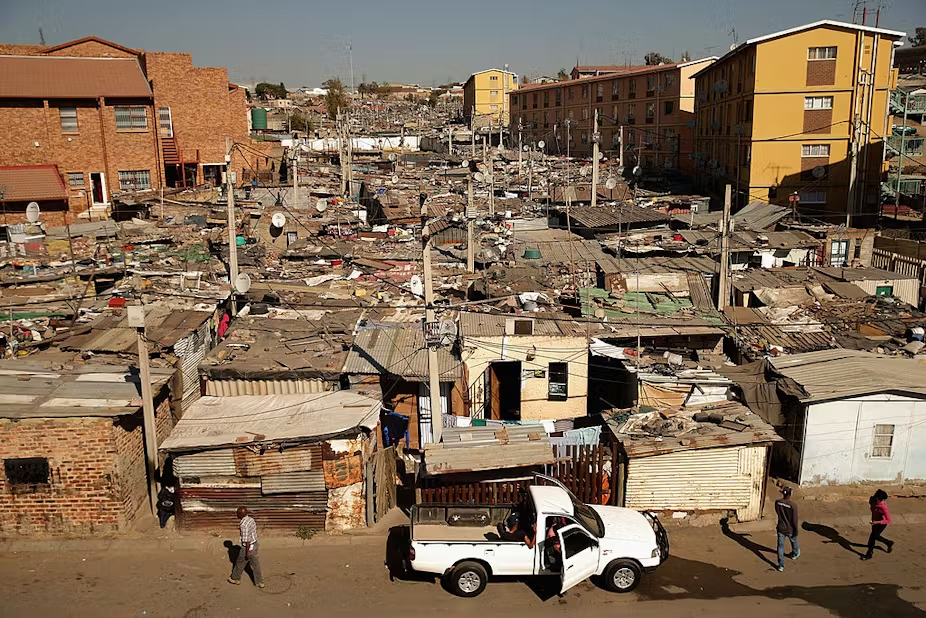A recent World Bank report has declared South Africa the most unequal country globally, with race playing a significant role in the stark wealth disparity.
The report highlights that just 10% of the population holds over 80% of the nation’s wealth, underscoring deep-rooted systemic issues. Some striking statistics are that the top 0.01% of people – just 3,500 individuals – own about 15% of all of the wealth in South Africa. The top 0.1% own 25% of the wealth.
Report highlights:
- Global Ranking: South Africa is identified as the most unequal country in the world, ranking first among 164 nations. Neighbors in the Southern African Customs Union also rank among the most unequal countries in the world.
- Wealth Disparity: 10% of the population owns over 80% of the nation’s wealth.
- Racial disparities account for 41% of income inequality; education contributes 30%.
- The unemployment rate among the black population is 37.6%, significantly higher than the national average and the 7.9% rate among white South Africans.
Titled “Inequality in Southern Africa,” the report ranks South Africa first among 164 countries, noting that nearly three decades post-apartheid, race continues to be a critical factor influencing economic inequality. The findings indicate that racial disparities account for 41% of income inequality, while education contributes 30%.
The legacy of colonialism and apartheid, characterized by racial and spatial segregation, perpetuates these inequalities.
- Botswana
- Eswatini
- Lesotho, and
- Namibia
highlighting that they also rank among the world’s most unequal nations.
In this region, women earn, on average, 30% less than men with equivalent education, with the pay gap reaching as high as 38% in South Africa and Namibia.
Land ownership further compounds these issues, particularly in rural areas. In Namibia, for example, 70% of commercial agricultural land remains owned by individuals of European descent.
The World Bank’s analysis, conducted before the COVID-19 pandemic, utilized the Gini coefficient to assess income inequality. The report reinforces concerns about the failure of existing systems to adequately address these deep-seated disparities.
According to one analysis, income inequality measures only a portion of the real inequality in South Africa. Measuring inequality in wealth gives a more complete picture of how unequal a society is. Income is only one factor that determines wealth. Wealth also includes inheritance, earnings from assets, and so on.
The broad picture is that in South Africa, wealth inequality is much worse than income inequality.

Government Initiatives and Challenges
In response to these ongoing inequalities, Tshediso Matona, director of South Africa’s Black Economic Empowerment Commission (B-BBEE), announced plans to implement stricter measures, including penalties for non-compliance, to achieve the program’s goals.
🇿🇦South Africa Aims to Improve Black Empowerment Scheme |
The South African government passed the empowerment law in 2003 to encourage companies to hire and promote black people by offering them tax breaks and access to public contracts.
More than two decades later, the… pic.twitter.com/riFxU2bxd2
— BitKE (@BitcoinKE) September 25, 2024
The B-BBEE initiative, established in 2003, aims to promote employment and advancement for black South Africans through incentives for businesses. Despite these efforts, a staggering 37.6% unemployment rate persists among the black population, significantly higher than the national average and far exceeding the 7.9% unemployment rate among white South Africans.
Critics have accused the African National Congress (ANC), which lost its parliamentary majority in recent elections, of failing to fulfill promises to alleviate crime, poverty, and unemployment.
Matona emphasized the urgency of addressing these disparities, stating:
“There’s no society that can be viable with this level of inequality.”
He also noted the prevalence of ‘fronting,’ a practice where companies misrepresent black individuals in management roles to inflate their B-BBEE scores. Despite numerous complaints since 2017, no convictions have occurred due to the complexities of the justice system.
As part of ongoing reforms, Matona intends to enhance compliance incentives and publicly name companies that fail to submit required reports. President Cyril Ramaphosa, leading a coalition government formed after the ANC’s recent electoral losses, has pledged to illustrate the benefits of black empowerment to businesses, warning of potential penalties for non-compliance.
However, the Democratic Alliance (DA), the coalition’s second-largest party, has expressed opposition to punitive measures, emphasizing that businesses exist for profit rather than altruism.
_________________________________________








